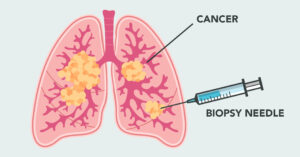Mesothelioma Diagnosis
A diagnosis for mesothelioma typically requires an examination from a specialist as well as imaging tests, such as CT scans or MRI scans. If you are concerned about your symptoms and want to know if you have mesothelioma, speak with your doctor about what tests might be appropriate for you.

How Mesothelioma Is Diagnosed
There is no one test for a malignant mesothelioma diagnosis in patients. Instead, doctors use a combination of tests to determine if you have the disease. These tests can include imaging scans, biopsies, and blood tests. Imaging tests can show the location and size of a tumor, but they cannot tell whether the tumor is cancerous. A biopsy is the only way to diagnose mesothelioma. The biopsy should be done as soon as possible because the diagnosis may be missed if not caught early enough.
The rare cancer mesothelioma most often affects the lining of the lungs. It is caused by exposure to asbestos, which is a material that was once widely used in construction and other industries. Symptoms of mesothelioma can be difficult to detect because they can be similar to other diseases, including lung cancer. Mesothelioma is an aggressive disease that spreads quickly to other organs in the body if not diagnosed and treated quickly.
How Does a Doctor Diagnose Mesothelioma?
A mesothelioma diagnosis begins with a physical exam and a review of your medical history, including any history of asbestos exposure. There are several types of tests that can be used to diagnose mesothelioma similar to other lung diseases. Your doctor may also order one or more imaging tests, such as X-rays, computed tomography (CT) scans, or magnetic resonance imaging (MRI) scans.
The most common is a mesothelioma chest x-ray, which can show the presence of tumors in the lungs. A chest x-ray can sometimes be enough to diagnose mesothelioma, as many tumors show up on images and can indicate a significant problem. Biopsies can be done to collect tissue samples and look for abnormal cells, including those associated with mesothelioma. Biopsies may be taken using several different techniques depending on where in your body an abnormality is suspected. Your doctor will discuss these options with you before making a decision about which biopsy type to use.
Diagnostic Test Types
A combination of tests has to determine a mesothelioma diagnosis due to its rarity and similar symptoms of other diseases.
Mesothelioma Biopsy Procedures

There are three types of biopsies that can be performed: thoracoscopy, open surgery (called an exploratory thoracotomy), or laparoscopy. Thoracoscopy is done with a camera inserted through an incision in the chest. If it’s not clear if there’s malignant tissue present, open surgery will be done for a definitive diagnosis.
The choice between the two depends on how accessible the tumor is and how healthy the patient’s lungs are. Laparoscopy may also be used to take samples from internal organs like the lungs. It may also be used instead of thoracoscopy if doctors suspect that there’s significant exposure to asbestos as well as a lung disease such as silicosis.
Mesothelioma Imaging Tests
Imaging tests like X-Rays, CT scans, and MRIs help doctors determine the exact location and size of the tumor or tumors. These factors help determine the stage of mesothelioma, optimal treatment options, and life expectancy.
Mesothelioma Blood Tests and Biomarkers
Mesothelioma genetic testing, blood tests, and biomarkers are all considered emerging diagnostic procedures because they are not yet accurate enough to confirm a mesothelioma diagnosis. Researchers hope that these tests can help rule out other diseases and certain treatment options. Commonly known blood tests for mesothelioma include MESOMARK, SOMAmer, and Human MPF. Researchers continue to develop blood tests meant to diagnose mesothelioma correctly.
Clinical Trials for Diagnosing Mesothelioma
There are currently some clinical trials being conducted for mesothelioma treatment. Many of these trials are testing new ways to treat cancer, whether treatment drugs or advanced diagnostic technology. The best way to determine if you qualify for a clinical trial is to speak with your doctor. You can also search for clinical trials online.
Mesothelioma Misdiagnosis
Doctors may misdiagnose mesothelioma because its symptoms are similar to those of other, more common diseases. Mesothelioma is commonly misdiagnosed as lung cancer or pneumonia. Patients can avoid misdiagnosis by getting a second opinion from a different doctor. Preferably, patients should visit a mesothelioma specialist with experience in biopsies and diagnosing the disease.
Get a Mesothelioma Diagnosis Case Evaluation
Diagnostic Tests By Mesothelioma Type
There are several types of mesothelioma, and each type is diagnosed differently. The most common type of mesothelioma is pleural mesothelioma, which affects the lining of the lungs. Other types of mesothelioma include peritoneal mesothelioma, which affects the lining of the abdomen, and pericardial mesothelioma, which affects the lining of the heart. Doctors may use different diagnostic tests depending on the site of mesothelioma.
Pleural Diagnostic Tests
To diagnose pleural mesothelioma, doctors first ask for a history of asbestos exposure and associated symptoms. Once they take the medical history, a physical exam and x-rays or CTs are the most common way to begin a pleural mesothelioma diagnosis. A biopsy will confirm the presence of pleural mesothelioma cells.
Pericardial Diagnostic Tests
Due to its rarity, pericardial mesothelioma is often diagnosed during surgery or other procedure to treat a different disease or condition. This form of mesothelioma, however, can also be detected via imaging scans.
Peritoneal Diagnostic Tests
Biopsies are commonly used to diagnose peritoneal mesothelioma. During the procedure, a doctor takes a sample of fluid buildup in the abdominal tissues. The biopsy measures proteins and red and white blood cell count to confirm the presence of peritoneal cancer cells.
Testicular Diagnostic Tests
Doctors often diagnose testicular cancers by conducting a physical examination first to check for lumps or swelling. Then, a blood test or ultrasound can find tumors.
Getting Treatment After a Mesothelioma Diagnosis
 After you’ve received a mesothelioma diagnosis, your next step is to determine the stage of mesothelioma (I through IV) before choosing a treatment plan. There are many different options available, and the best course of action for you will depend on the stage and type of mesothelioma you have, as well as your overall health. You may want to consult with a mesothelioma specialist to get the most accurate treatment recommendations. Once you’ve decided on a treatment plan, it’s important to stick with it and follow your doctor’s orders.
After you’ve received a mesothelioma diagnosis, your next step is to determine the stage of mesothelioma (I through IV) before choosing a treatment plan. There are many different options available, and the best course of action for you will depend on the stage and type of mesothelioma you have, as well as your overall health. You may want to consult with a mesothelioma specialist to get the most accurate treatment recommendations. Once you’ve decided on a treatment plan, it’s important to stick with it and follow your doctor’s orders.
Someone who is at an early stage of the disease, according to the TNM cancer staging system, might only need chemotherapy while someone at a later stage might also need surgery. Early mesothelioma screening plays a key role in treatment outcomes. The mesothelioma latency period, which is the period of time between first exposure to asbestos and the development of symptoms, can last for decades. It’s best to report any exposure to asbestos as early as possible. If you’re wondering how to get checked for mesothelioma, speak with your doctor soon.
Mesothelioma Surgery and Chemotherapy
In some cases, surgeons might remove part of the lung, called lung decortication, where mesothelioma has spread. The tumor could then be treated with radiation therapy after surgery to destroy any remaining cancer cells and prevent them from spreading elsewhere in the body. Mesothelioma is a serious illness, but with the right treatment, it is possible to manage the disease and enjoy a good quality of life.
Chemotherapy might also be recommended depending on how advanced your cancer is and how likely it is to improve a survival rate. Most often, stage 4 mesothelioma is not curable, and patients undergo treatments to reduce pain. Mesothelioma specialists may recommend a combination of different cancer treatments to maximize your quality of life.
Getting Legal Help After a Mesothelioma Diagnosis
After a mesothelioma diagnosis, you may be wondering what legal options are available to you. You may be entitled to compensation to cover the costs of medical bills, lost wages, and pain and suffering. An experienced mesothelioma lawyer can help you understand your rights and options.
Compensation comes in the form of a personal injury lawsuit or wrongful death claim filed by a loved one on behalf of a mesothelioma patient who passed away. In both cases, attorneys will need to prove that the victim was exposed to asbestos and that this exposure led to their cancer. For example, suppose you were diagnosed with malignant pleural mesothelioma after years of working with insulation containing asbestos fibers. In that case, an attorney could file a suit claiming that your employer knew about the dangers of asbestos, but failed to protect you from it.
If any of this sounds familiar to you check out our tips for finding a lung cancer or mesothelioma attorney near you or just contact us here.

